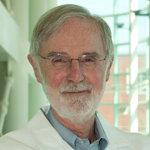Marcus E. Raichle, MD, of Washington University School of Medicine in St Louis, received a MetLife Foundation Award for Medical Research in Alzheimer’s Disease Feb. 24 in New York.
Both Raichle and this year’s other honoree, former Washington University School of Medicine faculty member Randy L. Buckner, PhD, have pioneered brain imaging techniques that are leading to new insights in the study of Alzheimer’s.

The awards presentation took place at a press conference in New York, with actor and Alzheimer’s advocate David Hyde Pierce as keynote speaker. Raichle will receive a $50,000 personal award; the MetLife Foundation will also give $200,000 to Washington University.
“Today, we salute two outstanding scientists, who take their place among a leading group of researchers who have been recognized for developing methods to combat and, perhaps someday, prevent Alzheimer’s disease from impacting future generations, society and the economy,” said C. Robert Henrikson, chairman, president and chief executive officer of MetLife Inc. “MetLife Foundation is proud of these awards, which for over two decades have supported the crucial work of leading scientists in Alzheimer’s research.”
For nearly 40 years, Raichle, professor of radiology, of neurobiology and of neurology, has been producing brain imaging research contributing to the way Alzheimer’s is now diagnosed and treated. Since joining the faculty of the School of Medicine in 1971, he has helped develop the fundamental set of tools that allow researchers to visualize mental activity in the human brain.
Among Raichle’s major accomplishments was his lab’s discovery of brain regions now known as the default mode network. Raichle’s team observed that imaging a person’s brain while it is not engaged with the external world shows specific brain activity patterns. These patterns are distributed across the brain, including memory systems and frontal systems. Raichle went on to focus on the intrinsic functional activity of the brain in its default mode as distinct from the activity evoked by behavioral or task-related events. His team’s measurements of brain energy consumption indicate that more than 95 percent of the energy used by the brain is burned by this default activity.
In recent studies, Raichle and his colleagues have found that brain regions in the default network are often among the first areas to be affected by Alzheimer’s disease. These changes may one day aid early diagnosis of Alzheimer’s disease.
Past Washington University MetLife Award recipients include David Holtzman, MD, the Andrew B. and Gretchen P. Jones Professor and head of the Department of Neurology; John C. Morris, MD, the Harvey A. and Dorismae Hacker Friedman Professor of Neurology and head of the Knight Alzheimer’s Disease Research Center; and Allison Goate, PhD, director of the Hope Center for Neurological Disorders.
Buckner is a professor of psychology and of neuroscience at Harvard University.
Washington University School of Medicine’s 2,100 employed and volunteer faculty physicians also are the medical staff of Barnes-Jewish and St. Louis Children’s hospitals. The School of Medicine is one of the leading medical research, teaching and patient care institutions in the nation, currently ranked fourth in the nation by U.S. News & World Report. Through its affiliations with Barnes-Jewish and St. Louis Children’s hospitals, the School of Medicine is linked to BJC HealthCare.